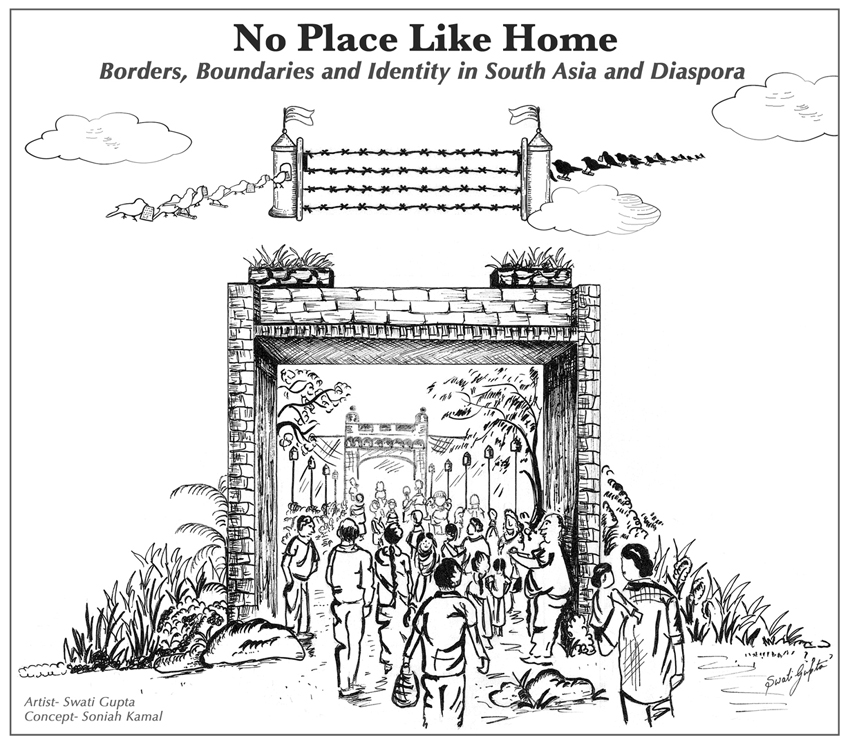I have had the pleasure of reading the latest issue of the online magazine Sugar Mule. Titled “No Place Like Home: Borders, Boundaries, and Identity in South Asia and Diaspora” and guest-edited by Soniah Kamal (one of our friends at the Atlanta Writers Club), the issue explores the “interconnected pathways” of the world through memoir, poetry, and fiction. All the pieces come from writers with connections to India, Pakistan, Bangladesh, or Sri Lanka, and together they create a rich, dynamic picture of a region whose cultural differences can cause conflict as often as the similarities inspire unity and prosperity.
Readers begin their journey with the engaging cover art by Swati Gupta, pictured below.
Sugar Mule has put together a wonderful collection of works that carefully balances regionalism and universalism, nationalism and individualism. There are elements of the exotic and the familiar in each piece; foreign words, foods, and traditions are woven in to allow for readers from all backgrounds to find common ground. The writers are fearlessly honest in these cultural translations between East and West, and take advantage of the opportunity to be creative. Kamal, for instance, amusingly compares the guttural sound of her grandfather’s chanted prayers to “gargling his soul.”
There are tales of leaving home, coming home, finding home, and rediscovering home. South Asia and Diaspora function alternatively as the land of the author’s ancestors, the oppressive homeland from which they must flee, the mysterious new world that offers a fresh start, or simply the only home that they have ever known. This issue of Sugar Mule emphasizes the confusion and confidence in identity that we as human beings continually, unceasingly struggle with as we try to remember our past, live in our present, and dream for our future.
The memoir portion of the journal is a powerful testimony to the strange nature of memories; they can be painful and joyful, clouded and clear, barren and abundant all at once. Pieces such as Hafiza Nilofar Khan’s “Crossing Borders on the Wings of Language” and Amulya Malladi’s “How I Learned the Meaning of Religion” offer striking portraits of life in the midst of conflict. Seen from a child’s eyes, the Partition and moments of national strife become a personal matter. Violence and death irrevocably alter their vision of humanity; you feel that their writing serves as a way of healing old wounds. Readers are challenged to interpret how these scenes from the author’s past have truly shaped them. “Memories are sometimes unreliable,” Malladi writes, and we all must question whether we have given a faithful account of our experiences or crafted an account that speaks to what we thought was happening to us. Soniah Kamal, in “Kashmir Calling,” focuses on the “weight of memories,” on the burden of carrying family stories with you as you remember the moments of happiness along with the times of grief and loss.
Equally thought-provoking are the issue’s poetry selections. Richly varied in style and subject, the poems offer imaginative cultural commentary in addition to inventive language. Stand-outs for me included Dipika Mukherjee’s “Migration, Exile… These are Men’s Words” and Shikha Malaviya’s “If Sita Had Met Persephone.”Mukherjee’s message is powerful and applicable for women everywhere: “I am no woman-poet-migrant-in-exile. / Keep your labels, please.” She describes how “women have always been torn up / like rice seedlings, to be replanted,” an experience that we have all had, in one form or another. “If Sita Had Met Persephone” is wonderfully clever, sensory, and ultimately tragic. Malaviya paints these mythical women in terms we can comprehend, making their stories as “mistresses of compromise” relevant today.
Poetry, Kamal explains in her editor’s note, is the bridge between the memoir and fiction sections of the issue. In the final genre, fiction, you find tales of expatriation, redemption, reunion, family, love, and sacrifice. Anjali Enjeti, another friend at the Atlanta Writers Club, offers a story of a man who, in the midst of desperate circumstances, has a chance to recover his lost sense of pride and purpose in “Homeland.” Sayantani Dasgupta, in her piece “Another Life,” describes the aftermath of choices, of living with the excuses and fears that caused opportunities to be lost. “Goddess Underground,” from ArtsATL’s Parul Kapur Hinzen, is a personal favorite. The storytelling is beautifully lyrical, offering a portrait of one woman’s madness and her futile attempt to restore lost glory. “Lunacy is contagious,” Hinzen writes, and she engages you in that lunacy as the woman’s faithfulness and sacrifice increasingly seem more divine.
I highly recommend taking a look at “No Place Like Home.” The writing within is full of color – color worthy of the diverse, lively, ever-changing human landscape of the region that serves as its centerpiece.
Read Sugar Mule for free here: http://sugarmule.com/43flash.htm


